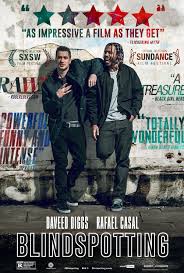
BLINDSPOTTING
US, 2018, 95 minutes, Colour.
Daveed Diggs, Rafael Casal, Janina Gavankar, Ethan Embry, Tisha Campbell, Wayne Knight.
Directed by Carlos Lopez Estrada.
Blindspotting was created by the two stars, Daveed Diggs and Rafael Casal. They worked together in a number of projects, especially short films, music videos. Diggs himself had significant roles in Hamilton. The director is Carlos Lopez Estrada, also noted for music videos.
This film is a variation of the Boyz in the Hood kind of neighbourhood film, focusing on African-Americans, poor situations and lack of opportunities, relationship with white people, racism, the police, crime and arrests. However, the setting is Oakland in the 2010s, comparisons with New York stories, contrasts.
The film creates the atmosphere of Oakland, the inner city, the streets, clubs, the accommodation for those on probation, homes, but also on Oakland society because of the work of the two central characters as removal of this, a variety of locations for their work.
There is also a love for rap throughout the film, various occasions for rap performances – but, especially for Diggs in a confronting finale with a police officer, a tour de force rap presentation.
The title is explained later in the film, a focus on one of those drawings where the observer sees one image and, with suggestion or otherwise, a different image within the same frame (black vase with two white profiles). The observer sees one or the other, the other blindspotted. And this is the case with observing the central characters of this film. Looking at the good or the bad and the of the blindspotted
To be Diggs is sympathetic as Coll in, released from prison, involved in a vicious fight with his friend of Miles outside a club. And witnessed by his girlfriend works at reception in the same removalist company as the two men. The film fast forwards to the last three days of his probation, his living in the halfway house and the demands made of coming in at 11 PM, of doing cleaning chores, the hostile attitude of the manager.
By day, he and his friend, Miles, are well occupied with their jobs – as well as conversations at reception.
Collin and Miles have been friends since childhood, one black, one white. Myles has married an African-American wife and they have a daughter. Miles’s erratic in his attitudes and behaviour, always taking tough attitudes, bursting out, teasing Collin. There are domestic scenes with his ever-patient wife, the little daughter trying to be tough, enjoying games with Collin.
In the latter part of the film, the fight that got Collin into trouble is visualised, a strongly vicious fight, Collin out of control, Miles more than vicious. Last night of his probation, Collin goes to Miles’ house, finds the little girl playing with the gun Miles has bought, desperate feelings to recover the gun. They go to a party, Miles picking a fight, again a vicious outburst.
But the final confrontation sequences are with the policeman. Early in the film, Collin was stopped in his removalist truck at a red light, suddenly sees a young African-American man who runs, a police officer emerging, shooting the man four times – and the news on television of this episode recurring through the film. At a removalist job, Collin finds that his wife has walked out on the policeman who is still in the house, their eyeing each other off, Collin and every rage coming to the surface, in a dramatic rap, the policeman terrified – but Collin, threatening with Miles gun, says he is not a killer and leaves.
The film was so successful that the makers decided to develop the story into a television series which ran to 16 episodes.